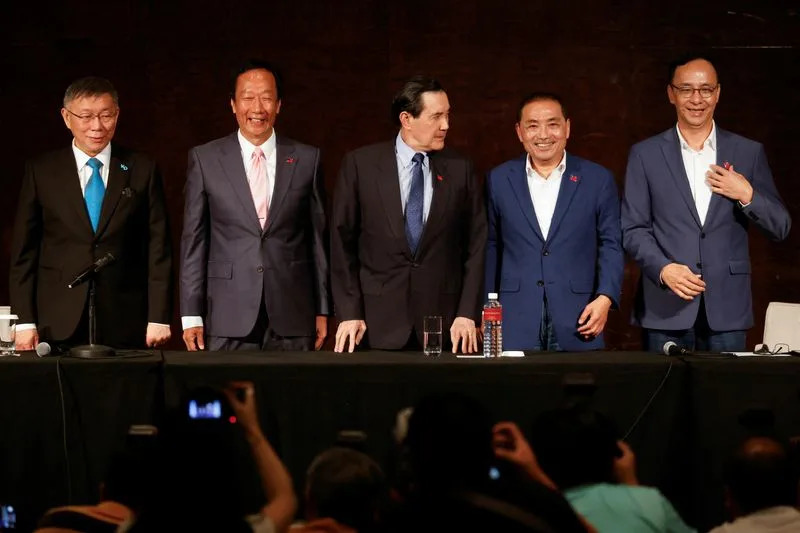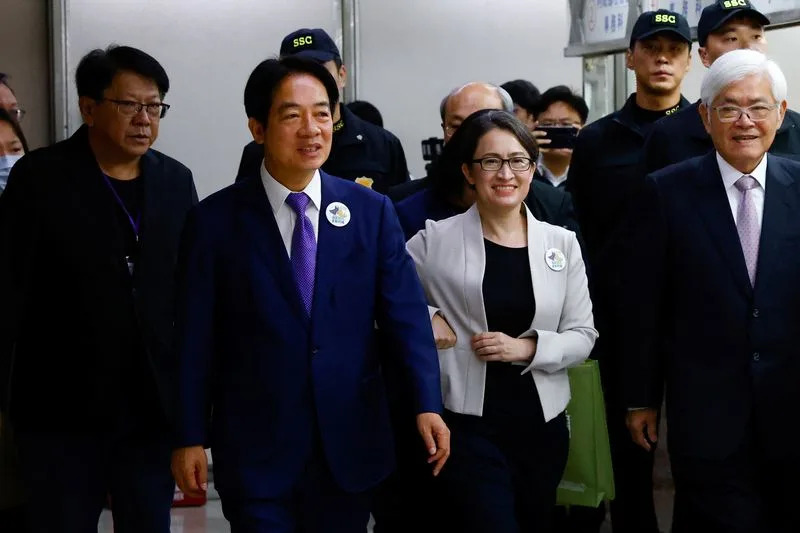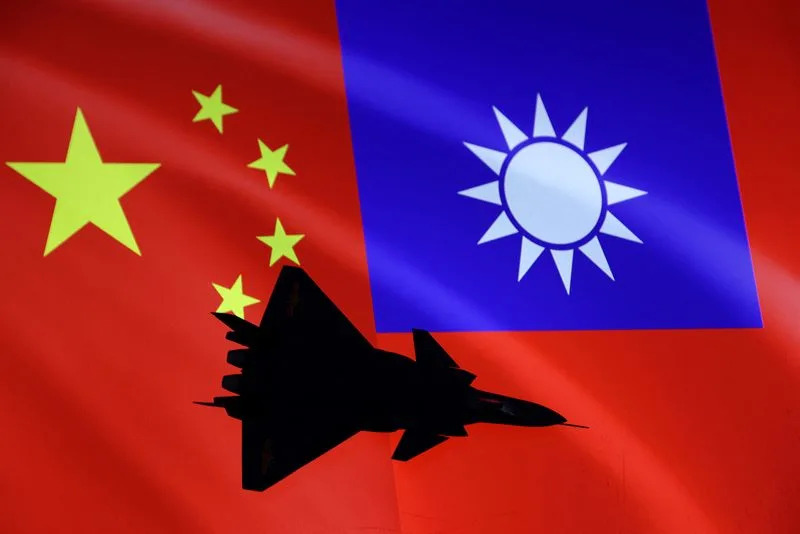TAIPEI-Taiwan's opposition parties rushed to register their presidential candidates on Friday with hours to go before a deadline, after talks on a joint ticket collapsed in dramatic fashion on live television amid bitter arguments.
The Jan. 13 election is taking place as China, which views Taiwan as its own territory, steps up military and political pressure to force the island to accept its sovereignty claims.
The opposition Kuomintang (KMT) and much smaller Taiwan People's Party (TPP), both campaigning to forge better ties with China, had agreed to work together against the ruling Democratic Progressive Party (DPP) but made no progress on plans for a united presidential ticket.
Late Thursday, the KMT walked out of last-ditch talks with the TPP held in front of reporters in a hotel conference room and shown live on television, after failing to reach agreement.
The talks were brokered by the billionaire founder of major Apple supplier Foxconn, Terry Gou, who is running as an independent candidate.
In one of the most dramatic moments, the KMT's presidential candidate, Hou Yu-ih, read a private text message from TPP candidate Ko Wen-je in which Ko said Gou needed to "find a reason" to drop out of the presidential race.
Hou and Ko will on Friday morning go to the election commission to register their separate presidential runs, ahead of a 0930GMT registration deadline. It is unclear who they will announce as their running mates.
Gou, who has trailed far behind in the polls, has not said whether he will also register.
By contrast, a united DPP has been charging ahead in its election campaign, registering its presidential and vice presidential candidates on Tuesday.
The DPP's Lai Ching-te, Taiwan's vice president, has consistently led in the polls.
Speaking at a campaign event late Thursday, Lai talked about his team's busy schedule, discussing policy with voters and the media, and poured scorn on the opposition's disunity.
"Should we dare to hand over the business of running the country to these people?" Lai said. "Of course this is not OK."
Taiwan's stock market mostly brushed off the impact of the ongoing political drama, though travel-related plays dropped on concerns that relations with China would not improve and Chinese tourists would not return to Taiwan.
The tourism and hospitality sub-index was down more than 2% on early Friday trade. The benchmark index was up 0.1%.
Taiwan ruling party powers ahead as chaos engulfs opposition campaign.
Taiwan cannot afford chaos or "experiments" when it comes to being president, the front-runner to be the island's next leader said on Wednesday as the opposition remained mired in a bitter dispute on mounting a joint presidential challenge.
The Jan. 13 election will shape Chinese-claimed Taiwan's relations with Beijing at a time China has stepped up military pressure to assert its sovereignty claims.
Vice President Lai Ching-te of the ruling Democratic Progressive Party (DPP), who China views as a separatist, leads opinion polls to be Taiwan's next president. Talks between the two main opposition parties to team up and take him on have floundered and are in deadlock.
Lai and his running mate, Taiwan's former U.S. envoy Hsiao Bi-khim, formally registered with the election commission on Tuesday to run in the election, but it remains unclear what the opposition will do. The deadline to register is Friday afternoon.
Lai told reporters he and Hsiao were "confident and determined to lead Taiwan steadily in the chaotic situation".
"Taiwan cannot afford chaos and experimentation at this moment," he said.
Only candidates with experience and ideas can successfully lead Taiwan to continue its steady progress, Lai said, standing with the DPP's lawmaker candidates for Taipei city.
Taiwan's main opposition party the Kuomintang (KMT), which traditional favours close ties with Beijing, had agreed with the much smaller Taiwan People's Party (TPP) last week to offer a joint ticket to take on Lai.
But neither party can agree how to interpret opinion polls on which of their candidates, the KMT's Hou Yu-ih and TPP's Ko Wen-je, should stand for president and which for vice president.
Hou on Tuesday called for re-opening talks on the opinion polls and said he had never insisted he had to be the presidential candidate.
The KMT's interpretation of the polls was that Hou being presidential candidate put him best placed to win over Lai and Hsiao, which the TPP has rejected as unscientific and not in line with its statistical analysis.
On Wednesday, Ko's campaign director Huang Shan-shan gave no sign of backing down and criticised what she said were attacks on her, the TPP and Ko by the KMT.
"Our enemy is Lai Ching-te. This turmoil has let Lai lie around at home. He's very happy," Huang said.
Ko, asked at a separate event what was going to happen, said: "There are still two days, don't be nervous".
Another presidential candidate is Terry Gou, the billionaire founder of major Apple supplier Foxconn who is standing as an independent but has also yet to formally register and has trailed in the polls.
His running mate, the actress Tammy Lai, briefly visited the election commission on Wednesday to pick up registration documents, but declined to say whether she and Gou, who did not accompany her, would actually register.
Bombarded by questions from reporters, Gou's campaign spokesman Huang Shih-hsiu would only say that "anything can happen" before the Friday deadline.
Taiwan reports Chinese fighters, bombers nearby as election campaign heats up.
Taiwan again reported Chinese military activity around the island on Wednesday, with 11 aircraft crossing the sensitive median line of the Taiwan Strait as the island's election campaign kicked into high gear.
Democratically-governed Taiwan, which China claims as its own territory, has complained for the past four years of regular Chinese military patrols and drills near the island, as Beijing seeks to pressure Taipei over its sovereignty claims.
Taiwan holds presidential and parliamentary polls on Jan. 13 and candidates have to register with the election commission this week in order to take part.
The ruling Democratic Progressive Party (DPP), which Beijing views as separatists, registered its presidential ticket on Tuesday, though the opposition is mired in disagreement about a potential joint bid.
Taiwan's defence ministry said that starting early Wednesday afternoon it had detected J-10 and J-16 fighters as well as H-6 bombers and early warning aircraft carrying out overseas missions.
Eleven of those aircraft crossed the Taiwan Strait's median line flying in airspace to the centre and southwest of the island, working with Chinese warships to carry out "joint combat readiness patrols", the ministry added.
The strait's median line had previously served as an unofficial barrier between the two sides and which Chinese planes now regularly fly over.
Taiwan sent its own forces to monitor, the ministry said.
China's defence ministry did not answer calls seeking comment. China says its activities near Taiwan are aimed at preventing "collusion" between Taiwan separatists and the United States and to protect China's territorial integrity.
Taiwan's government, which has repeatedly offered talks with China, rejects Beijing's sovereignty claims and says only the island's people can decide their future.
Taiwan's main opposition party, the Kuomintang, traditionally supports close ties with Beijing, and has pledged to re-open dialogue with China should it win the election.





